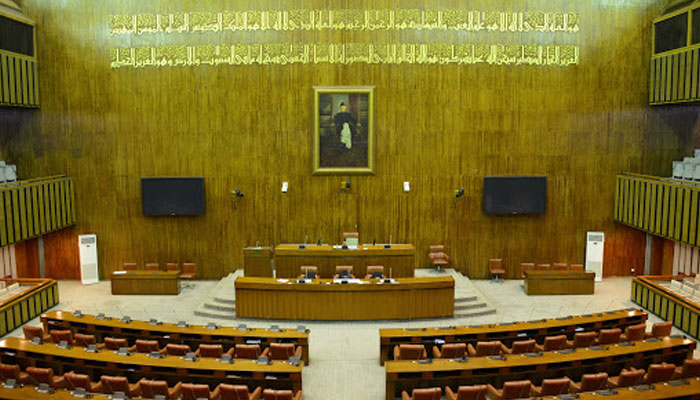Senate elections: Punjab, KP support open balloting

ISLAMABAD: The Punjab and Khyber Pakhtunkhwa governments have supported the holding of Senate elections through the open balloting and requested the Supreme Court to offer its opinion whether the polls should be held through the open balloting or show of hands.
In pursuance of the Supreme writ passed on January 4, Punjab and Khyber Pakhtunkhwa governments Saturday filed with the apex court their written synopses within the presidential reference seeking its opinion whether the polls should be held through the open balloting or show of hands.
It was learnt that the Attorney General for Pakistan will submit a written synopsis to the apex court on Monday, January 11.
The court had directed the attorney general to also submit whether the presidential reference was maintainable or not.
Submitting its written synopsis, the Punjab government – through its Advocate General Ahmed Awais – submitted that the provincial and National Assembly members’ illegal, immoral and unlawful acts of casting votes within the Senate election from time to time in violation of party discipline for private gains had led to an urgent desire to place an end to the present menace, which had shaken the essential principles of democracy.
The Punjab government submitted that Article 226 wasn't self-executing and thus required aid of supplementary provisions, which during this case were the provisions of Election Act 2017 laying down an entire vote .
Hence, it contended, the elections to the Senate aren't held solely under the Constitution but as a matter of fact they're also governed under the Election Act 2017.
“It is that the considered view of the province of Punjab that the reference in question may kindly be answered within the affirmative in order that by undertaking necessary remedial statutory action, the Election Act 2017 is amended so as for the election to the Senate to be held through open ballot”, the Punjab government submitted.
Similarly, the Khyber Pakhtunkhwa government in its written synopsis – filed through Advocate General Shumail Ahmed Butt – submitted that each voter had the proper to choose a free and fair manner and not confide in a person how he had voted but here ‘we are concerned with a voter who is elected by the masses on the ticket of a party and must now uphold the desire of his own electorate within the upcoming election of Senate.’
“Province of Khyber Pakhtunkhwa therefore sees great advantage if Senate elections are held through a system of open balloting,” he contended
It was submitted that the presidential reference seeking opinion of the apex court on holding the senate elections through open ballot and show of hands was maintainable.
The KP government submitted that Article 186 of the Constitution empowered the President of Pakistan that in matters where it had been desirable to get the opinion of the Supreme Court on any question of law, which he considers of public importance, he may refer the question to the Supreme Court for consideration.
It recalled that within the matter of Hisba Bill [PLD 2005 SC 873], this court had also examined the phrase “question of law” so appearing in Article 186 of the Constitution.
It was held that “(the) Constitution makers, by using expression ‘any question of law’ in Art.186 of the Constitution, had widened its scope and had also covered disputes which were likely to arise”, the KP government submitted adding that if such construction wasn't placed on the expression ‘any question of law’, there's apprehension that the provisions of advisory jurisdiction will become redundant”.
It submitted that the apex court within the case of “District Bar Association, Rawalpindi v. Federation ”[PLD 2015 SC 401], had held that “Democracy and its attendant forces were truth foundation of an independent judiciary”.
The question, thus mentioned , carries great public importance not just for a specific institution but during a wider canvas to the very pillars of this State.
The KP government submitted that the reference was therefore, not only maintainable and thus begs consideration but being so, warrants to be answered in affirmative.
This provincial government supports the reference sent by the president to the present court and prays that while answering the reference in hand, in affirmative, the court may very magnanimously hold that the federal government/parliament is empowered to undertake requisite amendments to the Election Act, 2017 and introduce voting through open ballot within the upcoming election of Senate of Pakistan”, the KP government submitted.
A five-member larger bench of the apex court – headed by judge of Pakistan Justice Gulzar Ahmed and comprising Justice Mushir Alam, Justice Umar Ata Bandial, Justice Yahyah Afridi and Justice Ijazul Ahsan – will resume hearing on January 11 on the presidential reference.
The court on January 4 issued notices to the committee of Pakistan (ECP) and Advocate General of Islamabad Capital Territory (ICT) besides issuing direction for publication of notices in newspapers for information of all concerns about the reference.
The court had appointed Haadi Shakeel from Balochistan as amicus curie (friend of court) for assistance within the instant matter.
The court had also directed the attorney general also as all advocate generals of the provinces, including the Islamabad Capital Territory (ICT), to submit their written synopses and adjourned the matter for every week .







0 comentários: